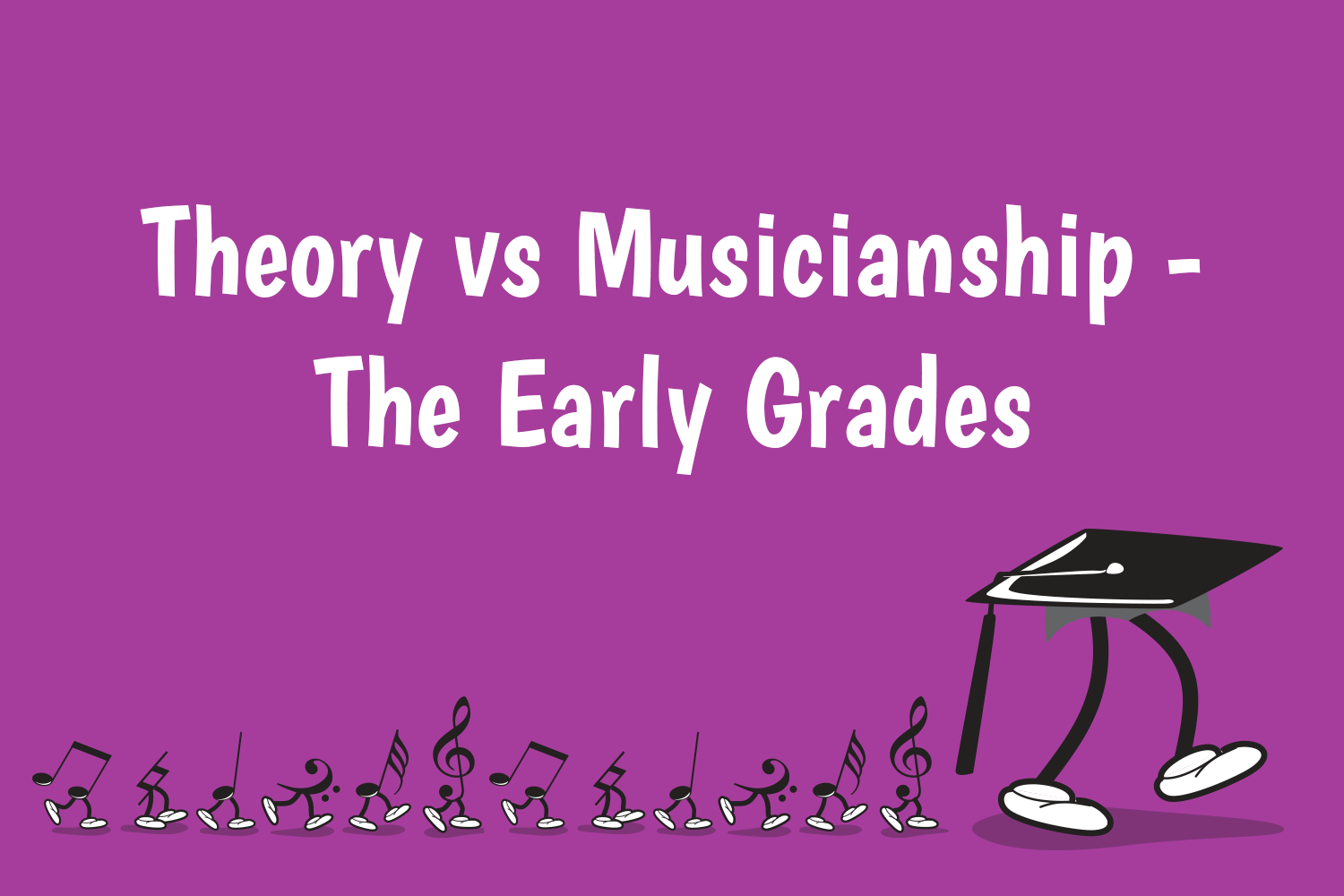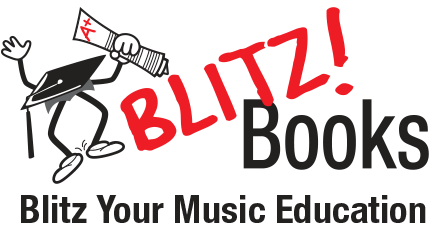Theory vs Musicianship – The Early Grades

As the author of texts for each of these AMEB syllabuses, the question I am asked most frequently is, “What’s the difference between Theory and Musicianship?”
For Grades 1, 2 & 3, the answer is: almost nothing. I find that by the time students finish Grade 3 in either one, they pretty much know the same things. The two syllabuses diverge at Grade 4, when Musicianship introduces an aural component as well as more music history in the written exam.
There is an urban myth around that Theory is ‘theoretical’ and Musicianship is ‘musical’. This myth probably stems from the names, given that the word ‘theory’ is commonly used to describe rudimentary concepts in music. However, the Musicianship syllabus was formulated not to provide any different or better study of music, but to enable the assessment of aural skills as well as written – a very sensible initiative, since music is indeed about what we hear.
So which syllabus should students and teachers choose? In the higher grades the choice is clear for those with reasonable aural skills: Musicianship. The written papers for Grades 4-8 are much easier than the Theory papers to allow sufficient time to study for the aural component. For example, the harmony section in Grade 4 Musicianship consists of harmonization of two cadence points only using root position chords in 4-part piano style, often to a given bass line – quite a simple step up from third grade. However, for Grade 4 Theory students must harmonise every note of a six bar melodic line in 4-part vocal style using root position and first inversion chords! Not only is this a massive jump from third grade skills, it is something Musicianship students do not encounter until sixth grade!
I have found that studying a combination of the two syllabuses works best if starting from the early grades. Grade 1 Theory deals with just C, G, and F major, which is a nice gentle introduction to key signatures. Grade 1 Musicianship launches straight into minor keys as well as the use of the quaver rest, so this can sometimes work well for the older beginner. Grade 2 Theory is also easier than Grade 2 Musicianship: just 8 keys to learn instead of 14.
For Grade 3, I switch my students to the Musicianship syllabus. As discussed above, I prefer the Musicianship syllabus for the higher grades because of the aural component and find that grade 3 is a good place to change over as it exposes students to some interesting concepts covered in Musicianship Grade 2 (M2), such as primary triads and technical scale degree names. (It is useful to spend a term or so on these M2 concepts before embarking on the M3 syllabus.) Although there are 21 keys to study in M3 as opposed to 14 keys in Theory Grade 3 (T3), by this stage most students are using a key signature table of some sort so this is usually not a problem. Some of the other differences between M3 and T3 in this grade are:
· M3 covers Imperfect cadences, T3 covers Plagal
· M3 covers inversions of intervals, which in Theory is not dealt with until grade 4
· M3 covers modulations, which in Theory is not dealt with until grade 4
· M3 introduces Binary and Ternary form, whereas this is covered in Theory grade 2 (I find this a very useful way to revise form after having studied Grade 2 Theory) ; T3 goes on to cover Rondo form
· T3 has almost twice the number of Italian Terms to learn as M3
· Interestingly, there is no escaping the folk songs in either syllabus – however at least now there is no requirement to write them out from memory!
In Theory there is an enormous jump from grade 2 to 3, and then again from 3 to 4! The Musicianship syllabus is more consistent in the increasing level of difficulty through the grades.
As mentioned earlier, the real differences come in from Grade 4; the Musicianship syllabus has the aural component. I feel that aural development is essential for any student and much prefer the Musicianship syllabus for this reason; however, Theory is much more popular around Australia! This amazes me, as the written papers for Theory are so much harder; students will opt for this over having to do an aural exam, yet the aural exams are not very hard at all!
Grade 4 Musicianship seems to be on a planet of its own with a written paper just 3 pages long covering only 4 concepts. This is to compensate for the (not hard) 30 min aural paper the day before. T4 tries valiantly to cover an enormous amount including stringed instruments and syncopation – some years there have even been certain concepts that have not been examined due to the fact that there are only 100 marks available!
There are all sorts of strange and wonderful discrepancies both Theory and Musicianship, and in 2007 the AMEB released a new syllabus: Music Craft. This syllabus is completely different, offering a Preliminary Grade entry point and consisting of both written and aural exams from the beginning.
There are syllabus comparisons for all grades on the Free Downloads section.

Hi Samantha, this is an interesting post. I am wondering whether you still follow the same path with your students now, as there have been some changes to the syllabi?
Yes I do Isabel. The syllabus changes are only subtle. I still much prefer Musicianship for Grades 4 and 5.
HI Samantha, I studied and passed Musicianship in the early eighties, doing 5th grade in 1986. Upon reading the above are my studies still relevant? or would I have to do the exams again? I did commence theory at the Lismore Conservatorium using your books but the course was discontinued before I completed any grades making private lessons the only options. Please advise.
Hi Bronwyn, absolutely your studies are relevant! (I also did mine in the eighties.) Are you asking if they satisfy as prerequisites? I cannot imagine why not.
Hi Samantha, my daughter has just done grade 3 theory of music, but I am now considering grade 4 musicianship rather than grade 4 theory of music. Do you know if grade 4 musicianship would be good enough to qualify for taking the higher level practical exams up to grade 8? You usually need grade 4 theory of music to do grade 8 practical exams. Thanks. Katie
Yes it does Katie. I usually switch my students to Musicianship from grade 4 onwards. It is a much more manageable syllabus, and gives them more time to practice their instruments!
Hi Samantha,
Does this mean that the syllabus for grade 5 theory is more challenging than same grade of musicianship?
Yes, absolutely. There is an aural exam for musicianship but it is not too difficult. Grade 5 Theory has much more complicated harmony requirements.
Hi Samantha, what sort of topics are covered in G4 Musicianship? My daughter did G3 Theory and I’m thinking whether I should change her to Musicianship for G4 – aural is not her strength but there are so many materials to cover for G4 theory! Thanks.
Hi I’m sorry I meant what sort of topics are covered in the AURAL component of G4 Musicianship… thanks.
Hi Helen,
You can listen to the tutorial for the aural exam on the BlitzBooks website. Just select the “audio files“ tab from the free downloads section. This will give you an excellent idea of what is tested.
Hi Samantha,
My daughter is planning to do practical G6 on piano this year but she hasn’t don any theory exam before. Would it be fine if she skip grade 1 book and study from grade 2 book? Thank you
This is definitely something you should discuss with her teacher!
Hi Samantha, I love your clear comparison between Theory and Musicianship exams. Do you feel Music Craft (which after reading your comparison of each type of exam) appears so much more detailed, is it not worth touching at all? Or would you compare it favourably as a good choice for all grades from Grade 1?
On another note, at what stage do you have students sit their theory exams? After one year of lessons? when they start preparing for their AMEB practical exams?
Thank you
Hello Haido, I feel that Music Craft is inaccessible for most students so I avoid it. Regarding students sitting exams, it is so incredibly individual… I would not be able to give any advice without knowing the student myself. However, I would certainly say that all theory should be learned in context with PLAYING the concepts. Hope that helps!